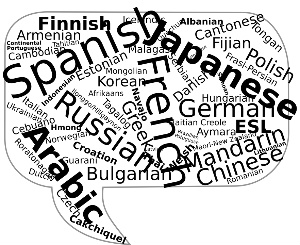So your company is looking to get some materials translated and you’ve been tasked with figuring out how to make that happen. The only problem is a few different people are suggesting that there’s no point in finding professional translation services when you can just ask a bilingual employee to do it for you. Asking your colleague to perform the translation seems pretty convenient, plus it doesn’t cost anything – but you know the documents are important and need to be translated well. So which is the better option?
The “Bilingual Employee Seems More Convenient Than a Professional Translation Provider ” Argument
 Those who work in translation often lament when they hear some version of the question:
Those who work in translation often lament when they hear some version of the question:
“Why should we use a professional translator when we can just ask ________ from accounting who is a native (insert language) speaker to translate for us?”
This is because languages are so nuanced; working with them can be considered a form of art – one that requires quite a bit of practice. Becoming a professional translator requires education, training, experience and sometimes certification to fully learn all the skills and techniques involved. Therefore, forgoing trained linguists automatically seems risky to those familiar with the challenges of conveying meaning across languages.
However, despite working for a professional translation agency, the team at Language Connections does understand where people are coming from when they ask this question. As professional linguists ourselves we know how costly translation can sometimes be. We also know how difficult it can be to find an agency that you feel like you can trust with your documents, your project’s timeline, and even the material in your content. Often the idea of having someone handle your translation internally just seems more convenient overall.
Depending on how serious your translation needs are, these factors can be enough to make you think going with an untrained speaker is better – after all, they are fluent and or proficient in their native language and English so they should be able to translate well correct?
While there are some cases when a bilingual employee might work in place of a professional, we have 5 reasons why usually you’re better off going with professional translation services in the long run.
5 Reasons You Should Consider Professional Translation Services
1. Professional translation services are provided by trained linguists

All this must be done while also keeping in mind the proper language to use for legal and ethical purposes when necessary (very important in legal translation and translation for pharmaceuticals for example). An untrained linguist may be able to directly translate your words across different languages; however, relying on him or her to know all the nuances of the culture you’re trying to reach, the technical language you’re trying to use, and any legal requirements concerning your documents may be risky.
There are also many instances when demonstration of certified document translation services is required. Agencies will often provide a certificate of accuracy upon completion of your project, that you can submit alongside your translation.
2. Professional translators are subject matter experts in both your industry and translation

If your company is looking to translate a highly technical report on its research findings in the pharmaceutical sector, you want a translator who is comfortable both with your target language as well as with incorporating your industry terminology and concepts into the translation.
Similarly if your company is looking to translate and localize its website, requiring work with UI/UX and software, you want a translator who is fluent in your target language, understands your business area, understands the culture of your target audience, and has relevant knowledge regarding design and coding – as all of these elements will factor into your translation.
An untrained linguist may only be able to do a small part of what is required for complex translation projects, and in order to avoid costly mistakes and redo’s in the future, going with professional translation services the first time around is a safer bet.
3. Translators and their translation agency know the language you need to use in order to pass certain legal requirements

As many people who have dealings in the legal and regulatory sector know, language can make or break a case. This can mean the difference between your patent being accepted abroad, or your international clinical trial being approved by the FDA (among many other scenarios).
Another point to keep in mind: countries have different legal systems. For example the US is based on Common Law, while countries like Spain, France or Italy use Civil Law – thus changing technical “legal language” and legal proceedings along with the actual language of the written text. Therefore, it is imperative that you entrust this kind of translation to professional legal translators, who not only possess the skills needed for translation, but know how it fits into and is used in international legal systems.
4. Professional translators and their agencies know how to culturally adapt your language for your target audience
Localization services are growing in importance as more companies conduct operations overseas, and as more individuals from diverse, multilingual markets look to interact with English-speaking establishments. The cliche of “you only get one chance to make a first impression” is highly relevant to situations in which you are trying to communicate with an audience that not only speaks a different language, but has an entirely different culture.
People look to build trust with brands, companies and individuals before they engage in any interactions with them. With that in mind, it’s easier to persuade an international market to buy your product, form a partnership with businessmen overseas, or provide education on a topic in a different country, if it is presented within the linguistic and cultural context the audience is familiar with and trusts. Translation agencies base their services off of linguists who are familiar with modern, international cultures, and market research depending on the type of project – elements you can’t necessarily expect a bilingual acquaintance to be familiar with.
5. Professional translation services generally involve translation technologies that can save even large projects a lot of money and time

Overall what they do is assist translators in providing you with high-quality linguistic services, in less time and for much less money (thanks to improved efficiency). Therefore, even if you have a highly technical project with a tight budget, it’s likely you won’t have to suffer in language quality to get an affordable translation.
When Would An Untrained Linguist Suffice?
While we can provide our opinion on this matter, the answer to this question is really up to you and your team. The best place to start when trying to decide between professional and untrained linguists is asking yourself what is the purpose and nature of your text?
- Is it short and simple language?
- Do you only need it for internal use, not for any major decision making processes?
- Do you have a very low budget that simply can’t afford professional expenses?
If you say yes to these questions then you may be fine passing your documents to a bilingual employee or friend. As a rule of thumb, if you have content that is highly technical in nature, has legal implications, or that needs to be presented in a way to appeal to a multilingual audience and culture, it’s best you choose professional translation services.
About Language Connections:
Language Connections is one of the top language service companies in the US. Over the last 30 years, we’ve focused on providing the best business translation services, interpreting services, as well as interpreter training and customized language training programs. In addition to top-tier corporate language training, we offer certified corporate interpreters and professional business translation services in 200+ languages. Our network includes linguists with backgrounds in all major industries. They’re ready to meet your needs, whether they’re for technical translation services, legal translation, government translation services, international development translation services, education translation services, life sciences translation, or something else. Reach out to us today for a free quote on our cost-efficient and timely translation services, interpreters, or other linguistic services.
Language Connections Inc.
2001 Beacon Street, Suite 105,
Boston, MA 02135
Phone: +1-617-731-3510
Email: service@languageconnections.com


